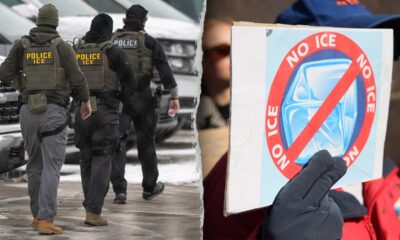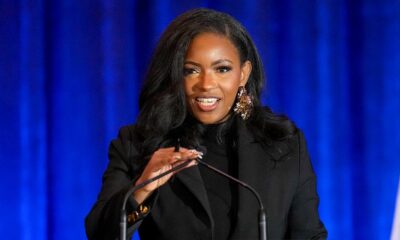Politics
Hollywood showed up in force for Kamala Harris at DNC, even if Beyoncé and Taylor were absent

Anyone who tuned in to the Democratic National Convention on Thursday night expecting to watch Beyoncé make a surprise appearance onstage was likely disappointed to see former Secretary of Defense Leon Panetta standing there instead, not a rhinestone to be found on his staid blue suit.
For weeks, ever since Queen Bey gave Kamala Harris’ campaign permission to use her stirring anthem “Freedom” as its theme song, speculation had mounted that she would perform at the convention — and that maybe she would even team up with fellow pop supernova, Taylor Swift, to send a woman to the White House. On Thursday, the theories shifted into overdrive on social media, thanks largely to a single tweet from a random X user teasing a surprise appearance on the final night of the event.
If the unchecked, unfounded Bey-Tay rumors now feel like a moment of virtual mass hysteria, it’s also easy to understand why so many of us got carried away with the showbiz wish-casting. The star power across the four nights of the Democratic National Convention was so potent, the mood so buoyant, it made sense that two of the only figures whose fame and influence transcends an increasingly fractured cultural landscape, would be there, too.
Organizers of the event — which was hastily revamped in a matter of weeks after President Biden dropped out of the race — pulled off a feat that seems impossible in 2024: turning the convention into must-see TV.
“For a celebrity, an athlete, a musician, to lend their name, their influence to a candidate, they are risking a lot — starting with some amount of trolling in the comment section. It’s not without its sacrifices, so you have to really be motivated to do it on behalf of a candidate,” said Genevieve Roth, founder and president of Invisible Hand, a culture change and strategy agency, who also served as director of creative engagement on Hillary Clinton’s 2016 campaign. “Kamala Harris seems to have inspired a tremendous amount of devotion from this community,”
Lil Jon, right, with Sen. Raphael Warnock of Georgia. The rapper led the state’s roll call Tuesday.
(Paul Sancya / Associated Press)
The DNC was a big tent, culturally speaking, offering a little something for virtually every taste, except, perhaps fans of aging professional wrestlers. There were musical performances by Jason Isbell, Pink (and her adorable daughter, Willow Sage Hart), Patti LaBelle, Sheila E., Stevie Wonder and — who could forget? — Lil Jon, who helped turn the once-tedious state roll call into an exuberant dance party. Celebrity hosts anchored each evening’s lineup, with Mindy Kaling cracking jokes about the demise of Bennifer 2.0, and Kerry Washington staging a reunion with her “Scandal” co-star, Tony Goldwyn. Kenan Thompson, the longest-tenured “SNL” cast member in history, did a funny-but-scary bit about Project 2025.
Golden State Warrior Steph Curry offered his endorsement as did his coach, Steve Kerr. The first three nights of the convention drew in around 20 million viewers each, while Thursday night attracted 26 million — outpacing the Republican National Convention last month. Similar to the Oscars, some of the best moments came not from the big celebrities, but the normal people being themselves, like Gov. Tim Walz’s teenage son, Gus, who wept with joy at the sight of his father onstage.
In the absence of Beyoncé, the biggest celebrity moment was Wednesday‘s surprise appearance by media mogul Oprah Winfrey, who returned to Chicago, the city where she built her empire, to enthusiastically endorse Harris as “the best of America.” Winfrey has played the role of political kingmaker before: According to one study, her endorsement of Barack Obama in 2007 translated to a million votes for the candidate.
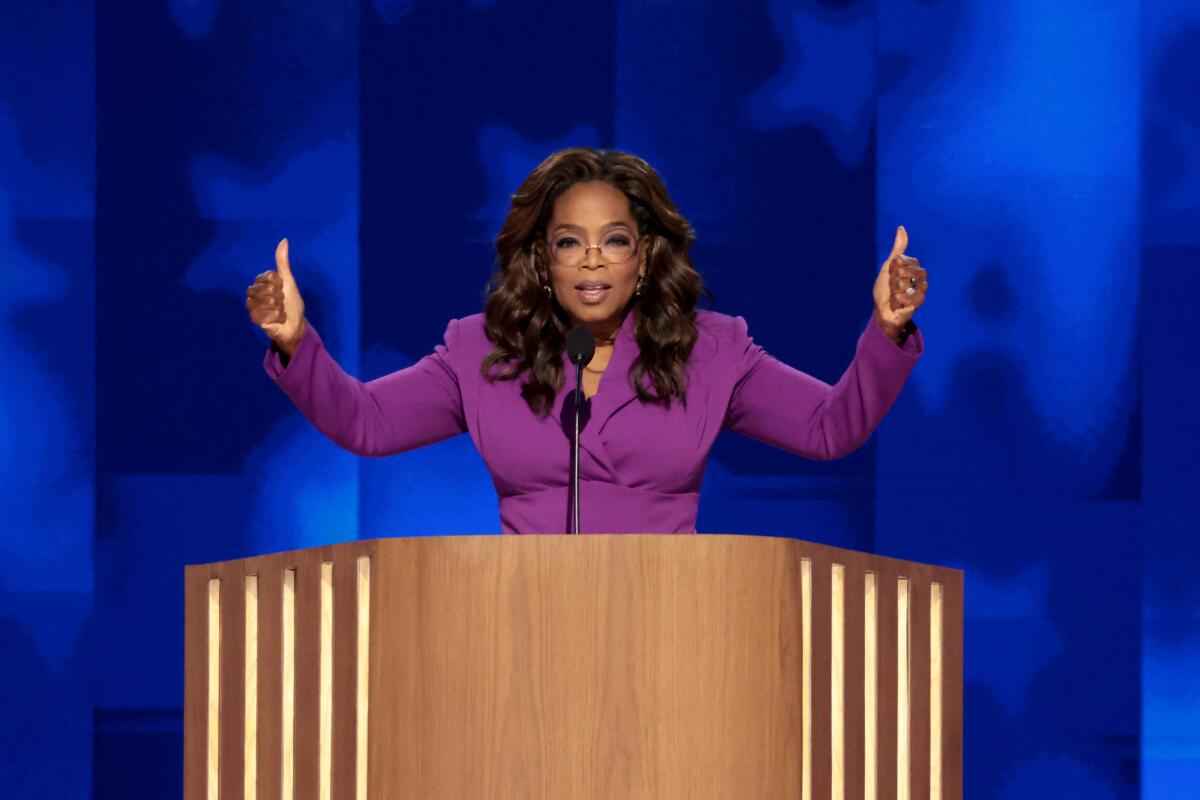
Media mogul Oprah Winfrey made a surprise appearance during the Democratic National Convention on Wednesday.
(Myung J. Chun/Los Angeles Times)
And while few stars these days wield her kind of influence, they can still have a potent voice.
“When a trusted source communicates about participating in our democracy in an authentic way, people are responsive,” said Ashley Spillane, who was author of a study by the Ash Center for Governance at Harvard University, which looked at efforts by celebrities like Billie Eilish and Washington to mobilize voters. It found that celebrities can have a powerful influence on the electorate — if the conditions are right. “The most important thing was that they were delivering a message to their community of fans in a way that felt on brand and authentic. As long as you are talking to people in your community in a way that is transparent and relatable, you can have a very significant impact,” Spillane said.
The Kamala-mania on display ever since Biden dropped out of the race last month, and especially over the last four days, has invited comparisons to Obama, who remains beloved by Hollywood and, since leaving the White House, has launched a successful Oscar-winning production company with his wife, Michelle, the former first lady.
The DNC offered a stark contrast with the Republican National Convention, where a scant handful of celebrities, most of whom peaked in the last millennium and have been mired in controversy, were supporting players in an event that was all about lavish displays of loyalty to one person: Donald Trump. There was Hulk Hogan, a man known for using the N-word in a sex tape; musician Kid Rock, who once flew the Confederate flags at his concerts, even though he is from Michigan; and Ultimate Fighting Championship President Dana White, who was caught on video slapping his wife last year. If speeches by Republicans other than Trump were memorable at all, it was for how shamelessly his former critics kissed the ring.
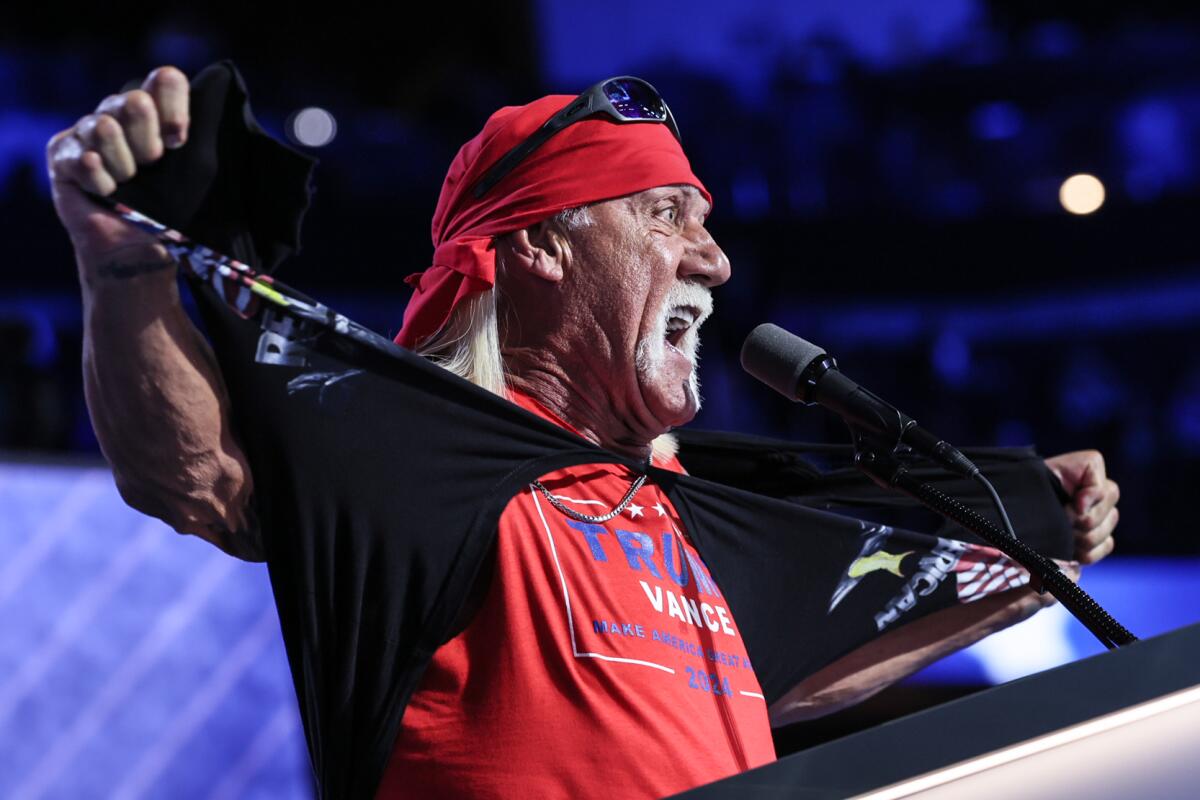
Hulk Hogan on the final day of the Republican National Convention in Milwaukee last month.
(Robert Gauthier/Los Angeles Times)
For all their professed disdain for “Hollywood liberals,” it is often the Republicans who appear to be more enthralled by celebrities, no matter how culturally irrelevant or low-wattage they might be. As long as they are willing to voice support for their party — and Trump in particular — any semi-famous person will do. The 2016 convention featured a cavalcade of names from a “where are they now?” special, including “Charles in Charge” star Scott Baio, “General Hospital” actor Antonio Sabato Jr. and former “Real World” cast member Rachel Campos-Duffy.
It’s telling that Trump and his running mate, JD Vance, were both reportedly motivated to take a hard right turn into politics after facing rejection from Hollywood and the liberal establishment. Trump, who resented how “The Apprentice” was snubbed at the Emmys and was known to exaggerate the show’s ratings — even to TV journalists — spent years teasing a presidential run. According to Roger Stone, he finally decided to get serious about a White House bid after getting brutally roasted by Obama and Seth Meyers at the 2011 White House Correspondents Dinner. Vance first made his name as a Never-Trump Republican who wrote a bestselling memoir, “Hillbilly Elegy,” that liberals read to understand the frustrations of rural white voters. But when the film adaptation, directed by Ron Howard, received a critical drubbing, it reportedly represented the “last straw” for Vance, who soon refashioned himself as a MAGA warrior and successfully ran for the Senate in Ohio.
Democrats have long had an edge when it comes to corralling big-name celebrities to their cause, said Roth. “If you look throughout history and election cycles, they’re doing a heck of a lot better than anyone on the other side is.”
Bill Clinton won the White House in 1992, fueled in part by his masterful use of pop culture, including a saxophone-playing appearance on “The Arsenio Hall Show.” Such was his power that Fleetwood Mac reunited for the first time in years to perform at his inauguration in 1993, a feat comparable to getting Beyoncé and Taylor Swift to sing together in public.
But there’s an inherent danger, particularly in a party criticized for elitism, in giving too much ground to big-name actors or musicians who may not exactly scream “salt of the earth.”
“I think it is a mistake to think about it as proximity to razzle-dazzle,” said Roth. Instead, the animating questions, she said, should be: “How can you deploy people for their incredible storytelling ability? How can you make sure that you’re connecting them to the issues and the people on the ground living the issues?”
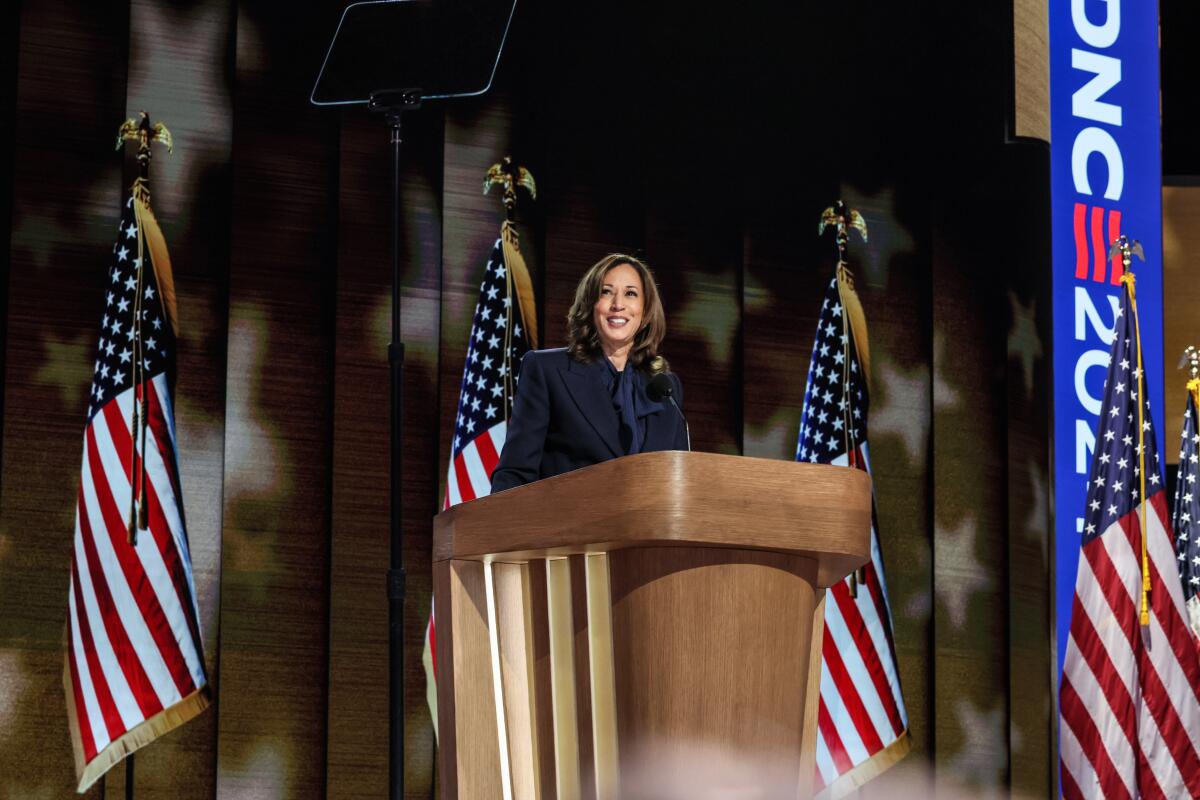
Vice President Kamala Harris on Thursday accepting the party’s nomination for president at the Democratic National Convention.
(Robert Gauthier/Los Angeles Times)
Biden had the support of Hollywood, at least behind closed doors at fundraising events, until the first debate in June when he delivered a performance so disastrous that showbiz allies like George Clooney called for him to drop out. When he eventually did July 21, the party quickly consolidated around Harris — and so did the stars, who have flocked to her candidacy with enthusiasm not seen since Obama‘s campaign in 2008.
Hours after Biden’s announcement, British pop star Charli XCX tweeted, “Kamala IS brat,” an apparent endorsement that triggered a flood of memes that delighted Gen Z while confusing their parents. And Harris’ first rally as the presumptive nominee, in Georgia, featured an appearance by Megan Thee Stallion. While stopping short of an explicit endorsement, Beyoncé provided the campaign not only with a theme song, but an inclusive slogan that sums up its stance on issues as diverse as abortion and gun violence.
The perceived value of an endorsement from Swift, who supported Biden in 2020 but has not yet weighed in on this year’s election, is so high that Trump shared fake images of the singer, dressed as Uncle Sam, with the message, “Taylor wants you to vote for Donald Trump.”
“Taylor Swift and Beyoncé have huge followings and fans who really enjoy being in community with one another. It’s natural to look for the places that and the people who can help you organize,” said Spillane, who is also founder and president of Impactual, a social impact agency.
DNC organizers didn’t let the bold-faced names overshadow the rising stars in the party — or its nominee. Now that the convention is over, it seems obvious why they wouldn’t have wanted Beyoncé or Taylor Swift to perform, even if the musicians had made themselves available: It would have undercut the air of normalcy and relatability the campaign fought so hard to cultivate. And instead of talking about Harris’ speech, fans would have been obsessing over Swift’s outfit and whether Travis Kelce was there, too.
The convention was in many ways less a showcase for celebrity activists than for the deep bench of talent in the Democratic Party, names like Rep. Alexandria Ocasio-Cortez of New York, Gov. Gretchen Whitmer of Michigan; Gov. Wes Moore of Maryland; and “Slayer Pete” himself, Secretary of Transportation Pete Buttigieg, whose speeches were all highly anticipated like top acts at a music festival.
“People are just happy to have a candidate that they can really get behind, and they’re happy to have the things that they care about articulated so clearly on stage,” Roth said.

Politics
Video: Defense Officials Give No Timeline for War in Iran as U.S. Boosts Forces

new video loaded: Defense Officials Give No Timeline for War in Iran as U.S. Boosts Forces
transcript
transcript
Defense Officials Give No Timeline for War in Iran as U.S. Boosts Forces
At a Pentagon news conference, top defense officials said that the U.S. military was sending more forces to the Middle East and expects to “take additional losses.” Earlier, President Trump said that the U.S. could continue striking Iran for the next four to five weeks.
-
“We didn’t start this war, but under President Trump, we are finishing it. This operation is a clear, devastating, decisive mission. Destroy the missile threat. Destroy the navy. No nukes. President Trump has all the latitude in the world to talk about how long it may or may not take. Four weeks. Two weeks, six weeks. It could move up. It could move back. We’re going to execute at his command the objectives we’ve set out to achieve.” “We expect to take additional losses. And as always, we will work to minimize U.S. losses. But as the secretary said, this is major combat operations.” Reporter: “Are there currently any American boots on the ground in Iran?” “No, but we’re not going to go into the exercise of what we will or will not do. I think — it’s one of those fallacies for a long time that this department or presidents or others should tell the American people. This — and our enemies by the way — here’s exactly what we’ll do. Why in the world would we tell you, you, the enemy, anybody, what we will or will not do in pursuit of an objective?”
By Christina Kelso
March 2, 2026
Politics
Gas prices could jump as Middle East tensions threaten global oil supply

NEWYou can now listen to Fox News articles!
Americans could soon see higher gas prices as escalating tensions in the Middle East threaten a critical global oil chokepoint, raising fears of supply disruptions that could quickly reverberate across U.S. energy markets.
After joint U.S.–Israeli strikes, dubbed Operation Epic Fury, targeted Iranian sites over the weekend and killed Iran’s Supreme Leader Ayatollah Ali Khamenei, concerns quickly shifted to how Tehran might respond and whether oil infrastructure or tanker traffic could become collateral damage.
Any disruption to global crude supplies could translate into higher costs for American drivers at the pump.
“Every time we’ve had flare-ups in the Middle East like we’re seeing right now — and we’ve seen this kind of situation periodically over the last 50 years — it has caused significant disruption to energy markets,” economist Stephen Moore told Fox News Digital.
“I would expect we could see anywhere from 25 to 50 cents a gallon increase in gas prices in the short term,” he said.
Experts say Americans will likely pay more for gas due to the ongoing conflict in the Middle East. (Matthew Hatcher/Bloomberg/Getty Images)
Market data already shows prices moving higher.
Patrick De Haan, head of petroleum analysis at GasBuddy, said oil prices were up $5 per barrel, while wholesale gasoline prices had risen 11 cents per gallon.
He expects retail gas prices to begin climbing immediately, especially in areas where stations tend to adjust prices in sharp, periodic jumps.
The national average could hit $3 per gallon as soon as Monday, De Haan said, with some stations increasing prices by 10 to 30 cents this week and potentially more in markets that see larger price swings.
Moore warned that prices could climb further and remain elevated if vital transit routes or oil facilities are disrupted.
TRUMP PLEDGES TO ‘AVENGE’ FALLEN US SERVICE MEMBERS AS TENSIONS WITH IRAN INTENSIFY
The ongoing conflict in Iran is near a major energy corridor. (Contributor/Getty Images)
“Huge amounts of global oil travel through the Strait of Hormuz, so this could be incredibly disruptive, delaying delivery of oil and gas,” he said.
“The Iranians have already knocked out some oil facilities in the Middle East, and who knows what they’re up to next. When you have less supply, prices go up. The big question is whether this will be a temporary bump or something more prolonged.”
The ongoing conflict sits near the Strait of Hormuz, one of the world’s most strategically important energy corridors.
“This shipping route represents around 25% of global oil trade and 23% of liquefied natural gas trade,” explained Jaime Brito, executive director of refining and oil products at OPIS.
The Strait of Hormuz, a narrow shipping lane between Iran and Oman that has long been a flashpoint during regional crises, serves as a vital artery for global energy markets.
Roughly 20 million barrels of crude oil and petroleum products — about one-fifth of global oil supply — transit the strait each day, underscoring how disruption there can quickly send shockwaves through international energy markets.
HORMUZ ERUPTS: ATTACKS, GPS JAMMING, HOUTHI THREATS ROCK STRAIT AMID US-ISRAELI STRIKES
A satellite view of the Strait of Hormuz, a critical chokepoint for global energy supply, connecting the Persian Gulf to the Gulf of Oman. (Gallo Images/Orbital Horizon/Copernicus Sentinel Data 2025/Amanda Macias/Fox News Digital)
Highlighting the growing concern, Maersk, widely regarded as a bellwether for global ocean freight, said it will suspend all vessel crossings through the Strait of Hormuz until further notice and cautioned that services to Arabian Gulf ports may be delayed.
Still, not all price movements are immediate.
“Developments over the weekend in the Middle East should hypothetically take time to ripple into the global supply chain. An initial assessment would suggest no specific price impacts should be seen in the gasoline market across the world, including the U.S.,” Brito told Fox News Digital.
However, Brito said prices could climb quickly if markets expect trouble ahead, even before supplies are actually affected.
As a result, Brito said, developments in Iran may have already translated into higher gasoline, diesel and other fuel prices in parts of the U.S., depending on regional supply dynamics and individual company pricing strategies.
CLICK HERE TO DOWNLOAD THE FOX NEWS APP
Experts say the increase in gas prices will be largely determined by how long the conflict in the Middle East lasts. (John McCall/South Florida Sun Sentinel/Tribune News Service via Getty Images)
From a domestic standpoint, Brito added that gasoline prices follow a seasonal pattern, typically climbing during the summer travel months.
“March prices are not expected to be significantly high,” he said, noting that spring break travel could support demand in certain areas — but not at the level seen during peak summer driving season.
Ultimately, the direction of gasoline prices will depend less on seasonal demand and more on how the geopolitical situation unfolds in the days ahead.
Politics
Iran’s supreme leader killed in U.S.-Israeli attack, Trump says

TEHRAN — The U.S. and Israel pummeled Iran early Saturday in an attack aimed at razing the Islamic Republic’s nuclear ambitions and thwarting its efforts to influence the Middle East though proxies such as Hezbollah and Hamas.
Iran’s Supreme Leader Ayatollah Ali Khamenei was killed in the attack, according to President Trump, who in a post on Truth Social wrote that “one of the most evil people in History, is dead. This is not only Justice for the people of Iran, but for all Great Americans.”
More than 200 people were killed in Iran and hundreds more injured, according to Iran’s Red Crescent.
The attacks spurred a furious Iranian retaliation, with multiple barrages striking Israel, a number of Gulf nations and Jordan; and fulfilled long-standing fears that a confrontation with Iran would plunge the entire region into war.
Reports of Khamenei’s death prompted diverse reactions worldwide: In portions of Tehran and Los Angeles, home to a large Persian population, people took to the streets to celebrate. In New York, protesters gathered at Times Square to denounce the attack.
The attack came eight weeks after U.S. forces deployed by Trump toppled Venezuelan President Nicolás Maduro, and Trump said Saturday’s operation also presented a chance for regime change.
Addressing the Iranian people, Trump said, “When we are finished, take over your government. It will be yours to take.”
Trump made the comments in an eight-minute prerecorded video. “This will be probably your only chance for generations,” Trump said, adding, “For many years, you have asked for America’s help, but you never got it. No president was willing to do what I am willing to do tonight.”
The Iranian government confirmed Khamenei’s death.
The attacks began with Israeli strikes Saturday morning — a workday in Iran — on Tehran, the capital, with residents speaking of attacks near Khamenei’s compound, the presidential palace, Iran’s National Security Council, the ministries of defense and intelligence, the Atomic Energy Organization and a military complex.
-
Share via
In Tehran there were scenes of panic, with residents racing to stock up on supplies, leaving shelves bare in grocery stores across the city. Others, heeding warnings from authorities of further strikes, decided to leave the capital. Images on social media showed highways leading out of Tehran choked with traffic.
“It’s going to take 10 hours at least, but it doesn’t matter,” said Zainab, who was loading her car with whatever she could stuff inside for the drive to her sister’s home in Iran’s northeast.
By the end of the day, the streets of Tehran appeared all but abandoned, with residents hunkering down for a night punctuated by the sounds of blasts reverberating across the capital.
Israeli Prime Minister Benjamin Netanyahu, a vociferous advocate for attacking Iran — and who has spent years urging Washington to do so — said the campaign would continue “as long as needed.”
Trump, who long insisted Iran cannot have nuclear weapons, also addressed Iran’s efforts in the Middle East in his video message.
“We are going to ensure that the region’s terrorist proxies can no longer destabilize the region or the world, and attack our forces,” he said. “And we will ensure that Iran does not obtain a nuclear weapon.”
Trump also said U.S. military forces “may have casualties,” adding, “That often happens in war.”
The Iranian Foreign Ministry, in a statement, said that “Iranians have never surrendered to aggression.”
Iranian Foreign Minister Abbas Araghchi, who was leading Iran’s delegation in Oman-brokered negotiations, said the war on Iran was “wholly unprovoked, illegal and illegitimate.”
“Our powerful armed forces are prepared for this day and will teach the aggressors the lesson they deserve,” he wrote on X.

Iranians protest on Saturday in Tehran against attacks on Iran by Israel and the United States.
(Majid Saeedi / Getty Images)
Israel’s military said its attacks were the largest military flyover in its history, with some 200 warplanes dropping hundreds of munitions on about 500 objectives.
Outside of Tehran, explosions could be heard in other cities, including Isfahan, Karaj, Kermanshah, Qom and Urmia, according to Iranian state media. An attack on the city of Minab struck a girls’ school, killing at least 85 students and injuring dozens of others, state-run media said.
Iran’s Red Crescent later said 201 people were killed in attacks across the country, and that 24 out of Iran’s 32 provinces were hit. More than 700 people were injured.
Cellphone and internet communications were disrupted shortly after the attacks began but have since been restored.
Iran struck back across the Middle East, with barrages reported on U.S. bases in the United Arab Emirates, Qatar, Bahrain, Kuwait, Iraq, Saudi Arabia and Jordan. Debris from one of those missiles killed one person in the UAE; another struck a hotel in Dubai. A Kuwaiti airport was hit, but no injuries were reported.
Iran also dispatched multiple waves of missiles to Israel, with residents in Jordan, Syria and Lebanon seeing vapor trails crisscrossing the skies above and the explosive sounds of interceptions.
The waves of ordnance spurred airspace closures across the region, with many airlines suspending service to affected countries and leaving tens of thousands of people stranded.
Araghchi informed his Iraqi counterpart, Fuad Hussein, on Saturday that Tehran will limit its response to U.S. military bases in the region, and that Iran was acting in self-defense.
But the attacks nevertheless infuriated Arab governments. Many came out with statements excoriating Iran for what they described as an unprovoked attack on their sovereignty.
Russia, whose ties with Iran have deepened in recent years, demanded Israel and the U.S. halt military operations. According to the Associated Press, U.N. Ambassador Vassily Nebenzia said, “We insist on the immediate resumption of political and diplomatic settlement efforts … based on international law, mutual respect and a balance of interests.”
In a sign of the rapidly expanding impact of the war, messages purporting to be from Iran’s Islamic Revolutionary Guard Corps were sent to ships ordering them to stay away from the Strait of Hormuz with “immediate effect.”
Shutting the strait, a strategic passageway through which one-fifth of global oil supplies pass, would probably lead to an immediate spike in energy prices and disrupt other shipping.
The opening salvos of what promises to be a lengthy campaign come two days after the U.S. and Iran concluded a third round of Oman-brokered negotiations in Geneva aimed at reducing tensions and stopping the prospect of war.
On Friday, Trump expressed displeasure with the pace of the talks, saying the Iranian side was not negotiating in “good faith” or giving in to U.S. demands. But Oman’s Foreign Minister Badr Albusaidi said a deal was “within reach.”
On Saturday, Albusaidi expressed dismay that “active and serious negotiations have yet again been undermined.”
“Neither the interests of the United States nor the cause of global peace are well served by this. And I pray for the innocents who will suffer,” he said in a statement on X.
The American strikes on Iran drew immediate reaction on Capitol Hill as Democrats and a small bloc of Republicans accused the White House of sidelining Congress on actions they fear will trigger a broader conflict in the Middle East.
“By the president’s own words, ‘American heroes may be lost.’ That alone should have demanded the highest level of scrutiny, deliberation, and accountability, yet the president moved forward without seeking congressional authorization,” Sen. Mark Warner (D-Va.), the vice chair of the Senate Intelligence Committee, said in a statement.
Rep. Ro Khanna (D-Fremont) called on lawmakers to back a measure he is co-sponsoring with Rep. Thomas Massie (R-Ky.) that would compel the administration to seek congressional approval before engaging in any further activity in Iran.
“The American people are tired of regime change wars that cost us billions of dollars and risk our lives,” Khanna said in a video posted on X.
As Democrats warned of constitutional overreach, other lawmakers rallied behind the president.
Sen. Roger Wicker (R-Miss.), the Senate Armed Services Committee chairman, said in a statement that Trump had taken “decisive action against the threat posed by the world’s leading proliferator of terrorism, the Iranian regime.”
“This is a pivotal and necessary operation to protect Americans and American interests,” Wicker said.
Secretary of State Marco Rubio notified some members of Congress’ Gang of Eight, which are the top four leaders in the House and Senate and top Democrats and Republicans on the House and Senate intelligence committees, according to CBS News.
Bulos reported from El Obeid, Sudan, Ceballos from Washington, D.C., and special correspondent Mostaghim from Tehran.
-

 World5 days ago
World5 days agoExclusive: DeepSeek withholds latest AI model from US chipmakers including Nvidia, sources say
-

 Massachusetts5 days ago
Massachusetts5 days agoMother and daughter injured in Taunton house explosion
-

 Denver, CO5 days ago
Denver, CO5 days ago10 acres charred, 5 injured in Thornton grass fire, evacuation orders lifted
-

 Louisiana1 week ago
Louisiana1 week agoWildfire near Gum Swamp Road in Livingston Parish now under control; more than 200 acres burned
-

 Technology1 week ago
Technology1 week agoYouTube TV billing scam emails are hitting inboxes
-

 Politics1 week ago
Politics1 week agoOpenAI didn’t contact police despite employees flagging mass shooter’s concerning chatbot interactions: REPORT
-

 Technology1 week ago
Technology1 week agoStellantis is in a crisis of its own making
-

 News1 week ago
News1 week agoWorld reacts as US top court limits Trump’s tariff powers




